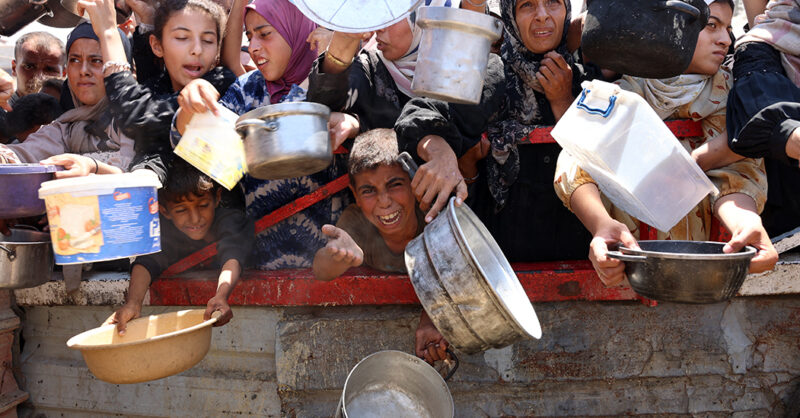
TOPSHOT - Palestinians crowd at a lentil soup distribution point in Gaza City in the northern Gaza Strip on July 27, 2025. (Photo by Omar AL-QATTAA / AFP) (Photo by OMAR AL-QATTAA/AFP via Getty Images)
A Day of Chaos: The Aid Truck Stampede
The narrow street leading to Ola’s home was half-littered with rubble and dust, a silent testament to weeks of bombardment. Then, like a siren call, the distant roar of an aid lorry broke the hush. Within seconds, a crowd surged forward—men, women, children—eyes wide with desperation, limbs moving instinctively toward salvation. The back of the truck swung open, and the first sacks were flung over the edge. Bags of rice, lentils, oil, unknown tins—a lottery of sustenance in an open-air arena where every item could mean the difference between life and starvation.
People fell over each other, scrambling to gather whatever they could. Some clambered onto the truck’s tailgate, grabbing with abandon. Others stayed on the ground, stretching arms amid flying packages. A batch of fragile food sacks hit the ground and burst—a rain of gnarled plastic and grains, fed by the frantic scramble. “Pick it up! Don’t let it go!” voices barked, as though muscles and bones had forgotten how to obey reason.
Death March and Dignity in Ruins
Amid the frenzy, an eerie procession glided through the crowd. Four men carried a coffin draped in a flag, chants of “Allahu Akbar” rising above the clamor. For a moment, the crowd bowed its head. The coffin passed, and hungry hands returned to the spoil. Death had become background noise—another unremarkable feature of Gaza’s battered landscape. Nothing stopped the battle for food. Not even mourning.
Picking Grains by Hand: A Father’s Despair
On the fringes stood a lone figure—bent, deliberate, collecting stray grains of lentils and rice from the dusty pavement. I recognised him before I saw his face: Ola’s father. Each grain was plucked with sorrowful care, as though it was a precious gem. He moved slowly, methodically, eyes fixed on the handful of grain rising between his fingers.
I turned and hurried away, unwilling to let him catch my gaze. My heart felt leaden, heavy with guilt at my own ability to walk freely. I pushed the vision to the back of my mind and pressed on, arriving at Ola’s door shaking from what I’d witnessed.
Sand and Stones in the Grain
Moments later, Ola appeared, bright-eyed but weary. Her father entered behind her, bearing a small plastic bag. Ola tore it open expectantly, then recoiled. “Baba, the rice is on top of the lentils—and it’s full of sand and stones.” His shoulders slumped. Gently, she reassured him: “Thank you. We’ll sort it out.”
They spread the bag across a metal tray. Dust motes danced in the fading light as we settled on the floor. “I’ll do the lentils,” Ola said, voice tight but steady. “You handle the rice.” We blew away the coarse dirt, separated broken grains, discarded stones. Each pebble and speck of grit felt like part of the siege—tiny reminders that even our only food was deliberately degraded.
Hunger as Identity
On Earth, hunger is a nudge—a reminder to open the fridge or visit a shop. Here, hunger is a second skin. It knots your insides, defines your waking hours, warps your sense of time so that an hour stretches into eternity. It shrinks your dreams until they barely fit inside your tattered blanket.
- Hunger rewrites priorities: survival eclipses ambition.
- Hunger chisels away dignity: no proud gaze remains when you beg.
- Hunger teaches cruel arithmetic: one meal for three children, one loaf for two days.
To normalize this agony is to surrender. Each moment of joy—however fleeting—must be grasped, or it may slip away forever. Accepting hunger as status quo means conceding defeat before the siege ends.
The Irony of Blockade Bureaucracy
Long before October 7th, Gaza endured a labyrinthine permit system dictated by an occupying power claiming unparalleled security concerns. Chocolate bars were deemed contraband; cilantro was considered a luxury threat; frozen salmon fillets passed inspection while essential medical supplies lingered in limbo. The blockade was a surreal experiment in administrative cruelty.
Today, the war has weaponized food itself. Aid is doled out by decree, under watchful eyes that measure sugar content and fibre length before granting passage. Flour is white gold; bread is miracle; everything else is suspicion. A single CVS-style aide package can become a battleground of paperwork, stamps, denials, then approvals—never free, always conditional.
A Siege of Souls
The line between life and death narrows each day. Bread queues snake through bombed-out streets. Mothers cradle infants who have never tasted fresh water; fathers carry empty sacks to the precarious promise of relief trucks. The foam of dust on shattered storefronts becomes the first course in a meal no one ordered.
The hunger I feel isn’t mere emptiness. It’s internal erosion: a slow unraveling of spirit, an existential attrition. It does not bruise the body but devours the soul. This is not famine by accident—it is famine by design, a slow-motion atrocity administered through bureaucracy and bombs alike.
Living Under a Forced Menu
We do not choose what we eat. The menu is curated in remote offices: rice passed, tomatoes withheld, sugar limited, lentils dictated. Chocolate is a punishable indulgence; fresh fruit, a distant memory. Each meal plan is a decree of subjugation—a reminder that our bodies and wills are subject to external authority.
Yet even in the narrow alleyways of hunger, we cling to hope. We reclaim small joys: the warmth of a shared sip of tea; the laughter of a child playing amid ruins; the act of picking clean grains as if we were sorting out chaos itself. In those acts, defiance flickers in the darkest night of siege.





